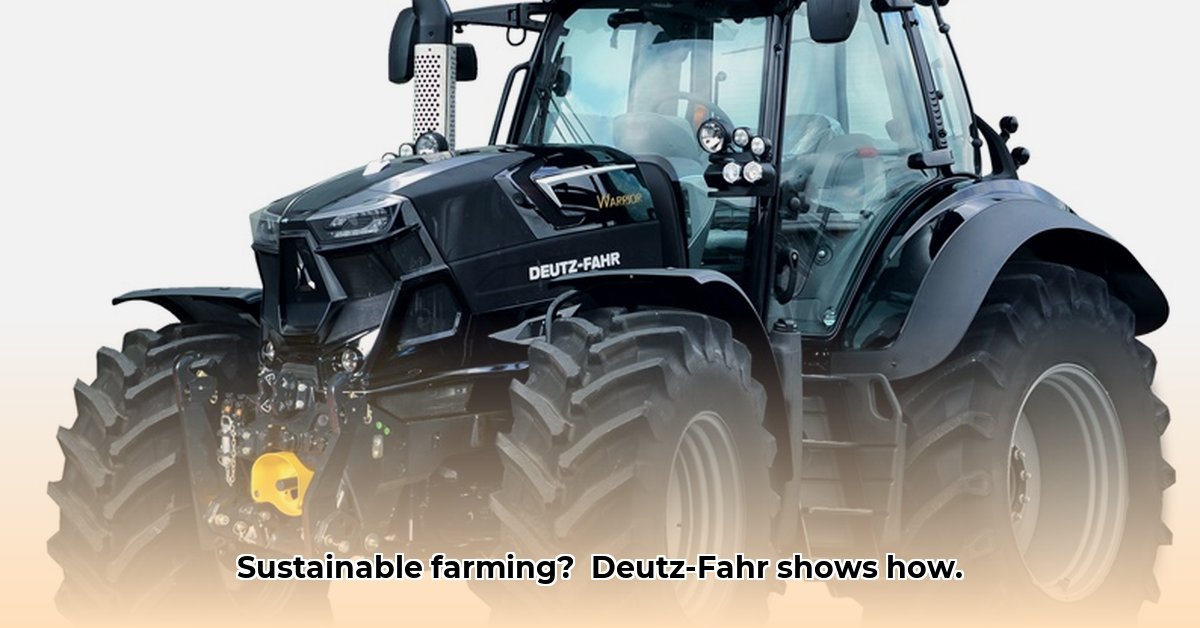
Deutz-Fahr tractors have a long history deeply intertwined with agricultural progress. For over a century, they've been instrumental in boosting farm efficiency and yields. However, the modern agricultural landscape demands not only productivity but also sustainability. This article examines Deutz-Fahr's journey toward environmentally responsible farming, analyzing their past, present efforts, and the future challenges they face. We will explore their sustainability initiatives, technological advancements, and the role of various stakeholders in achieving a greener future for agriculture. For comparison with other manufacturers' sustainability efforts, see information on small tractor options.
A Legacy of Innovation: From Military Applications to Sustainable Farming
Deutz-Fahr's history is marked by continuous innovation in agricultural machinery. Their tractors have consistently pushed the boundaries of efficiency and productivity. However, a less-discussed aspect of their history involves military production. This seemingly disparate element reveals the company's engineering prowess and adaptability. This adaptability, initially applied to building robust military equipment, is now being redirected towards creating more sustainable farming solutions. How effectively this transition is managed will be pivotal in shaping the company's future.
Significant Investment, Missing Transparency: The Land Facility and Beyond
Deutz-Fahr's €105 million investment in the Land facility signifies a substantial commitment to sustainable manufacturing. This investment aims to minimize waste, conserve resources, and reduce emissions. However, a critical element is missing: comprehensive transparency. The absence of publicly available, detailed data on key environmental performance indicators (like carbon footprint, water usage, and waste generation) hinders a full evaluation of their sustainability efforts. The lack of publicly accessible, independently verified data raises questions about the true effectiveness of these initiatives. Greater transparency is essential to build trust among farmers, investors, and environmental regulators.
Technological Advancements for Sustainable Agriculture: Precision and Efficiency
Deutz-Fahr is integrating cutting-edge technologies into their tractors to promote sustainability on the farm. Precision farming technologies, using GPS and sensors, optimize resource allocation, reducing waste and minimizing environmental impacts. Fuel-efficient engines also directly lower greenhouse gas emissions. However, a comprehensive comparison to competitor technologies requires more readily available data on metrics like fuel efficiency, emissions levels, and the effectiveness of their precision farming systems. Independent verification of these claims would enhance their credibility.
Navigating the Regulatory Landscape: Adapting to Future Demands
The agricultural machinery sector faces increasing pressure from environmental regulations. Upcoming regulations on emissions, waste management, and sustainable farming practices will significantly impact Deutz-Fahr’s operations. Proactive innovation and adaptation will be crucial for their long-term success. Investing in research and development to stay ahead of evolving regulations and consumer demands for sustainable agricultural practices is paramount.
Stakeholder Perspectives: A Collaborative Path to Sustainability
A truly sustainable agricultural future necessitates collaboration among all stakeholders. Deutz-Fahr's success depends not just on its internal initiatives but also on the engagement of farmers, investors, and regulators. What actions are needed?
| Stakeholder | Short-Term Actions | Long-Term Actions |
|---|---|---|
| Deutz-Fahr | Publicly release detailed, independently verified sustainability reports with quantifiable data. | Invest heavily in R&D of alternative fuel technologies (e.g., hydrogen, biofuels) and precision farming systems. |
| Farmers | Evaluate the long-term cost-effectiveness of Deutz-Fahr's sustainable technologies. | Adopt precision farming techniques and explore alternative fuel options for their tractors. |
| Investors | Scrutinize Deutz-Fahr's environmental, social, and governance (ESG) performance and demand greater transparency. | Invest preferentially in companies demonstrating verifiable commitments to sustainable growth. |
| Regulators | Implement and enforce stricter emission standards and incentives for sustainable agricultural practices. | Continue to evolve regulations to reflect best available science on climate change and environmental sustainability. |
Conclusion: A Call for Transparency and Collaborative Action
Deutz-Fahr’s journey toward sustainable agriculture is marked by both significant investments and a crucial need for greater transparency. Their history of innovation provides a strong foundation, but the path ahead demands a commitment to open data, robust reporting, and collaborative engagement with all stakeholders. Only through shared responsibility can we build a truly sustainable future for agriculture. The continued evolution of regulations worldwide will drive further innovation and necessitate ongoing commitment from all parties involved.